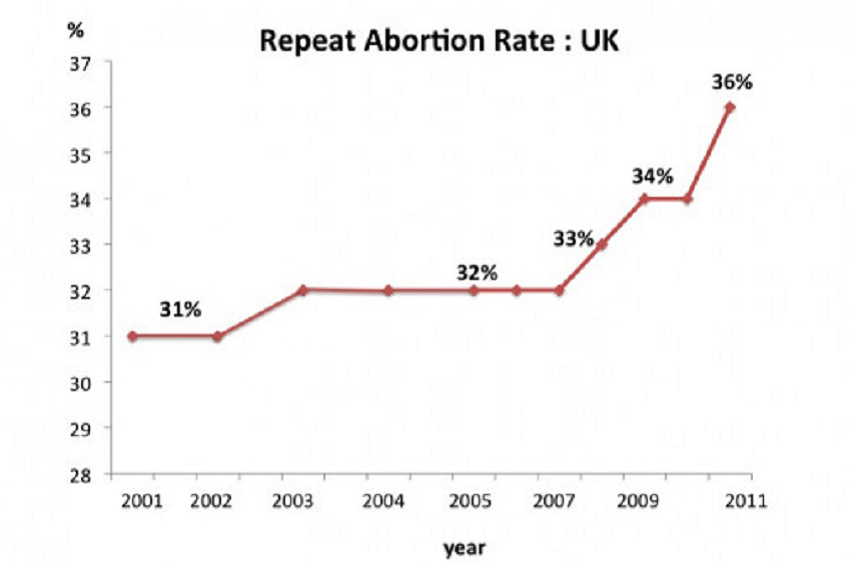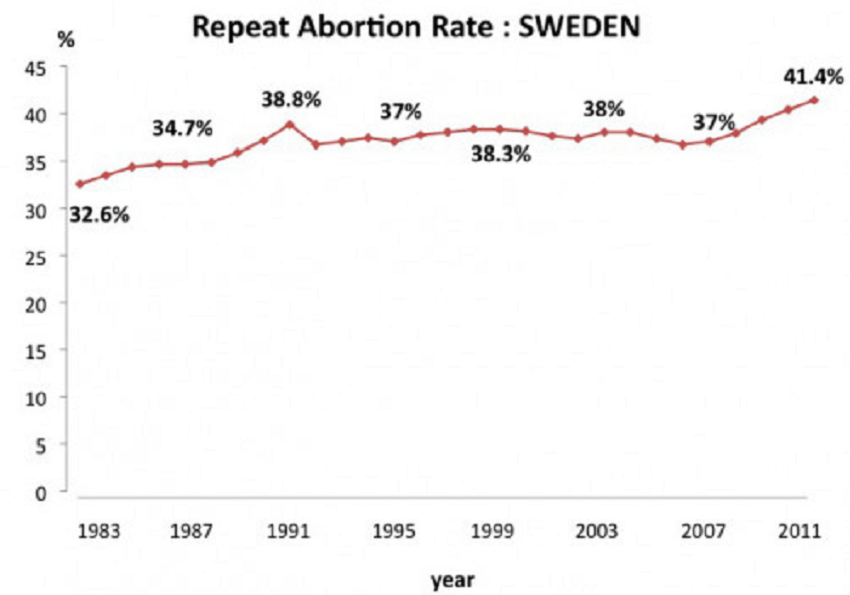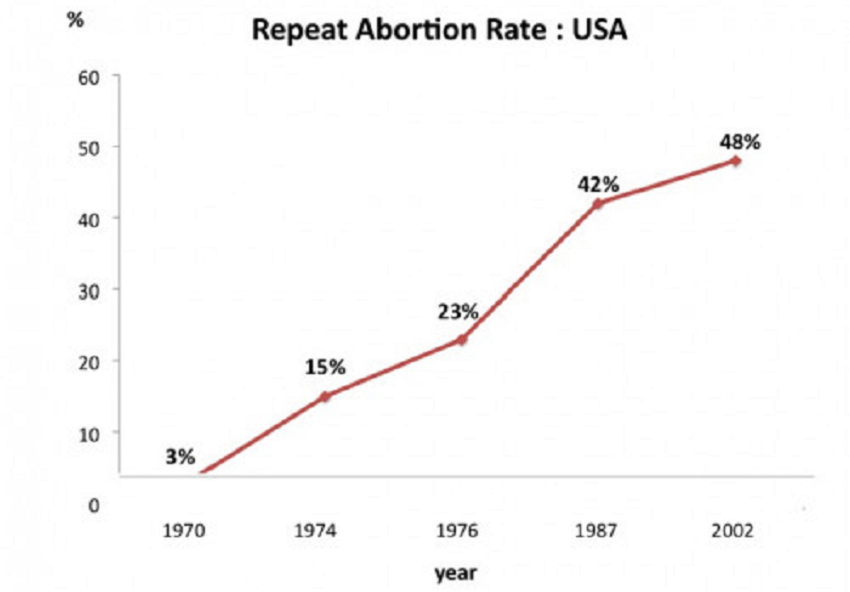Dont follow the failure: Repeat Abortion
Repeat Abortion

When abortion becomes readily available, statistics usually show women begin to have multiple abortions throughout their lifetime.
The numbers are truly shocking: 36% of abortions in Britain in 2011 were repeat abortions, while 41% of women in Sweden undergoing abortion in 2011 had at least one prior abortion. In the U.S. the repeat abortion rate is a staggering 48%.
One French study, "The Mathematics of Repeat Abortion: Explaining the Increase" offers a mathematical model to determine percentages of repeat abortions. The authors propose that the need for abortion is constantly present when abortion is permitted. The findings of the study shows that, over time, repeat abortions increase. 1 For the abortion industry, legislation allowing them access to young women in crisis brings in repeat abortions and more business.
See our other page: The Shocking Numbers in other countries
Britain: 36% are Repeat Abortions

- Source: 2011 and the same file for each previous year: https://www.gov.uk/government/...
- https://www.gov.uk/government/uploads/system/.../dh_127061.xls.xls
- http://www.telegraph.co.uk/health/healthnews/9297552/Rise-in-women-having-repeated-abortions-official-figures.html
France: 35% are Repeat Abortions

- Data from: http://paa2011.princeton.edu/p...
New Zealand: 38% are Repeat Abortions

- Statistics New Zealand : http://www.stats.govt.nz/
- http://www.stats.govt.nz/browse_for_stats/health/abortion/AbortionStatistics_HOTPYeDec11.aspx
Sweden: 41% are Repeat Abortions

USA: 48% are Repeat Abortions

From the Guttmacher Institue, the research arm of the abortion industry, even though the data only goes as far as 2003, it documnets the increse year on year in repeat abortions. Now, nearly half of all abortions are repeat abortion, a shocking indictment of so-called 'choice'

- Sources: 1973 – 1996: Henshaw SK et al., Readings on Induced Abortion, Volume 2: A World Review 2000, New York: The Alan Guttmacher Institute (AGI), 2001, Table 6. 1997 – 2004: Special distributions published by the Centers for Disease Control and Prevention, adjusted for year-to-year changes in the reporting states
Repeat Abortion Comparisons

The data above shows us that every country, except Hungary, in this dataset, saw an increase in the rates of repeat abortions - some very significant.
Women who have undergone multiple abortions before giving birth may also encounter serious health problems in regards to future pregnancies. A recent study, revealed that women who have had three or more abortions are more likely to give premature birth and deliver a baby with a poor birth weight. It was discovered in these situations that delivery could be earlier than twenty-eight weeks and the baby might require special hospital care to survive. Women who had two abortions were also subject to giving birth prematurely. 2
Lead researcher of the study, Dr. Reija Klemetti, claims that women should not be alarmed with the study's outcome and the risks are small. However, she does feel that it is necessary for young girls to be made aware of the potential risks of repeat abortions. 2
Hurting Women
Studies show that there are risks to women from repeat abortions - and to future pregnancies

The data above shows us that every country, except Hungary, in this dataset, saw an increase in the rates of repeat abortions - some very significant.
Women who have undergone multiple abortions before giving birth may also encounter serious health problems in regards to future pregnancies. A recent study, revealed that women who have had three or more abortions are more likely to give premature birth and deliver a baby with a poor birth weight. It was discovered in these situations that delivery could be earlier than twenty-eight weeks and the baby might require special hospital care to survive. Women who had two abortions were also subject to giving birth prematurely. 2
Lead researcher of the study, Dr. Reija Klemetti, claims that women should not be alarmed with the study's outcome and the risks are small. However, she does feel that it is necessary for young girls to be made aware of the potential risks of repeat abortions. 2
- Tornbom, M., et. al., “Repeat Abortion: A Comparative Study,” Journal of Psychosomatic Obstetrics and Gynecology, 17:208-214, 1996.
- http://www.ncbi.nlm.nih.gov/pubmed/8997687
Research also indicates that women who had repeat abortions were found to be more likely to abuse drugs or alcohol or to be living in unstable situations, to be divorced or be dependent on social services.
- Joyce, “The Social and Economic Correlates of Pregnancy Resolution Among Adolescents in New York by Race and Ethnicity: A Multivariate Analysis,” Am. J. of Public Health, 78(6):626-631 (1988); C. Tietze, “Repeat Abortions – Why More?” Family Planning Perspectives 10(5):286-288, (1978).
A 2012 study released from Finland’s National Institute for Health and Welfare found that women who have multiple abortions have a greater risk of premature birth and low-birthweight babies in subsequent pregnancies.
The study of more than 300,000 women, printed in the peer-reviewed medical journal Human Reproduction, found women who have three or more abortions face a 35% increase in complications for a future pregnancy - and also saw an increase in the risk of a baby’s death around the time of birth. Having just one abortion or more increased the likelihood of having a premature baby.
Dr Reija Klemetti, who led the study, said that the risk rose with the number of repeat abortions.

